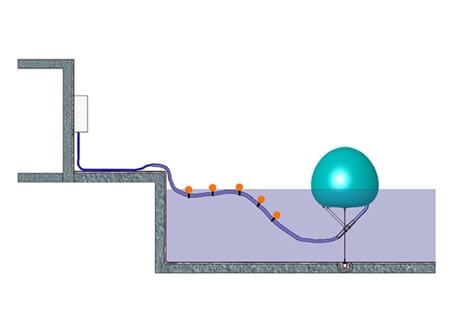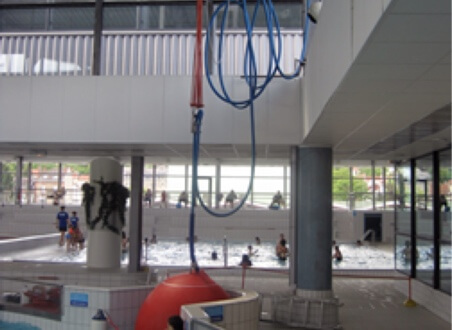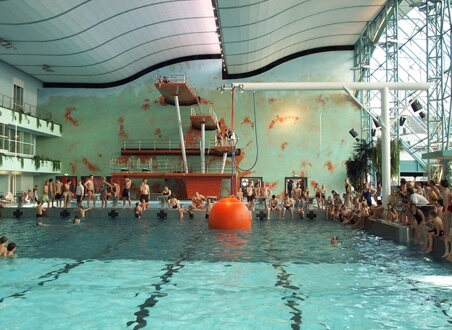WoW TechnologyDiscover
WoW Technology is based on the principle of resonance, a concept that enables the efficient and economical generation of natural waves in a basin.
Unlike traditional wave machines, which require heavy infrastructure, our solutions offer a more flexible, economical, and environmentally friendly alternative.
With over 500 installations worldwide, WoW Company is now a leader in artificial wave generation.
Our products are designed to adapt to all types of aquatic environments, whether in water parks, public pools, or private pools.
Our solutions ensure quick installation, minimal maintenance, and an immersive user experience.
We offer two complementary technologies: Waveball, a powerful fixed solution, and Easywaves, a mobile and autonomous wave ball.

One Technology, Two Solutions Waveball© VS Easywaves©
With our innovative waveBall technology, transform any water basin into a true ocean extension.
Thanks to the resonance principle, our unique solution reproduces the natural movement of waves, delivering an immersive and realistic experience.
- Reduced maintenance, limited to replacing the support elastic, maintaining the cable sheath, and cleaning the shell.
- Continuous power: Can operate 24/7, ideal for intensive use.
- Easy to use: No complex settings, simply start and stop the Wave Ball.
- Simple installation: Perfect for a new project or major refit.
- Minimal maintenance, limited to replacing the support elastic and cleaning the shell.
- Long autonomy: Up to 20+ hours of waves, depending on the model and usage.
- Fast charging: Battery charges from 0 to 100% in 5 to 12 hours, depending on the model.
- Unique and innovative charging system.
- Easy charging: No need to remove the ball from the pool to charge it.
- Ultra-fast installation: Less than 1 hour, with no pool modifications required, perfect for refits.
- Mobility: Easywaves© can be moved around the pool or even removed as needed.
Discover Easywaves© The First Battery-Powered WaveBall
After years of research and development, WoW is once again pushing the limits of innovation and unveiling a true revolution in the world of wave pools: Easywaves©!
A World First: Induction recharging with the power to recharge Easywaves© models in just a few hours.
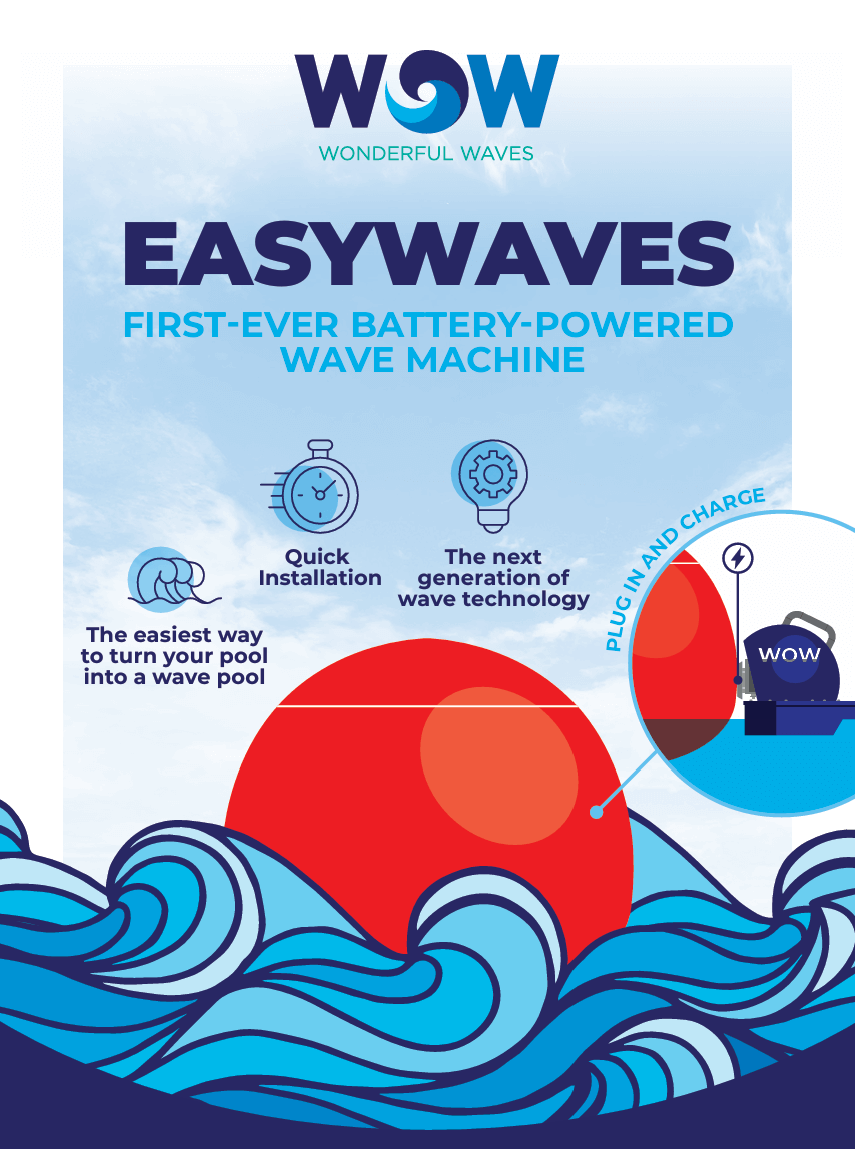
Where innovation meets the perfect wave Creating the best waves, made easy !
WoW solutions are much more economical and easier to implement.
Waveball and Easywaves allow for generating natural waves while minimizing technical and financial constraints.”
| Model | Standard Compressor Wave Machine |
Waveball | Easywaves |
|---|---|---|---|
| Wave Type | Limited, few adjustments | Variety, adjustable | |
| Consumption | Very high (several hundred kWh) | 0.4 to 1.5 kWh | |
| Noise | Noisy (80-100 dB) | Silent | |
| Infrastructure | Heavy and expensive | Simple cable | No adaptation required |
| Maintenance | High | Low | Very low |
| Safety | Mechanical risks | Secure | |
| Flexibility | Rigid | Semi-fixed | "Mobile, easy to remove" |
Best practice to optimize the Waveball
The choice for the WaveBall model depends mainly of the area of the pool, the desired wave amplitude, the depth profile and the quality of the resonance for the wave zone.
There are nine different models of Wave Balls, you can see them on our product range page.
To achieve the best results with our technology, it is useful to follow some best practices.
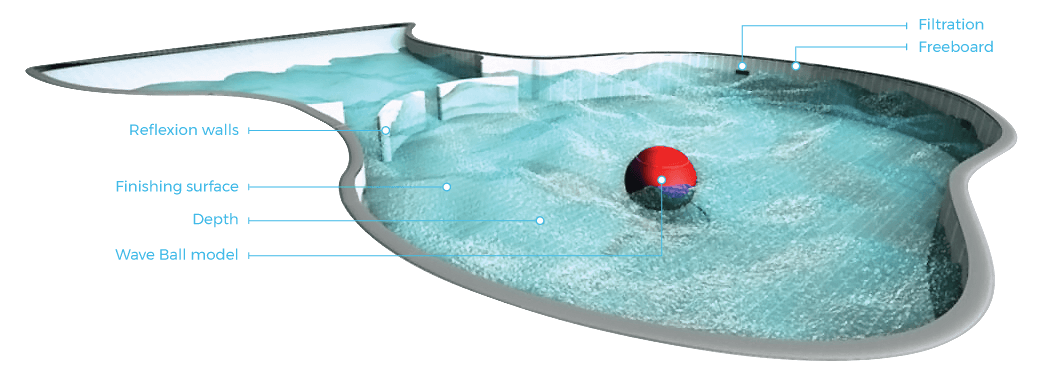
Locations of the WaveBall and anchorage
The anchoring position of the WaveBall is very important. Customer’s choices, safety restrictions and the result of the computer simulation must be taken into account. The WaveBall is anchored with a bungee in order to stay in its operating zone while having enough freedom for its vertical movements.
This anchor could be either on the ground either on the sides either in the ceiling depending on the configuration of the pool and your needs.
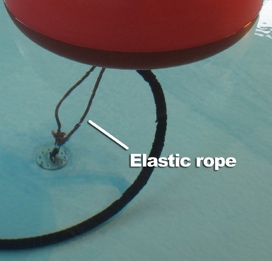
Edges/stairs
The edges and stairs reduce the reflection of the waves on the walls of the pool, which makes the resonance more difficult. The edges and stairs (or any other non-resonant stuff) will therefore preferably be separated from the wave zone thanks to specific reflection walls.

Reflection walls
The reflection of the waves is done on the walls of the pool. The resonance walls should be flat or concave to enhance the resonance. The resonant zone must not be specially closed. It is possible to create corridors for swimmers and/or to create exits with waves that spread through the rest of the pool, which is the case, for example, when the client wishes to configure his pool with a A zone with big waves and a B zone with lighter waves.
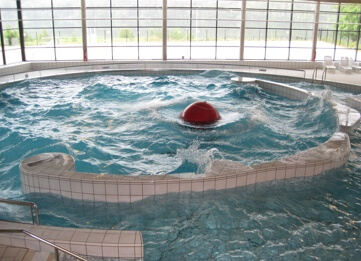
Freeboards height
The freeboard is the part of the free wall located above the water level.
It allows the reflection of the waves created by the WaveBall.
The height of the freeboard will be the element that will determine the maximum amplitude of the wave.
For a wave amplitude A (cm), it is necessary to have free edges of height 2A / 3 (cm).
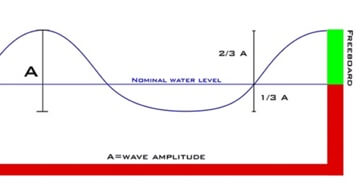
For infinity pools or for some specific configurations, it is possible to create freeboards with aesthetic walls fixed to the walls of the pool.
Several solutions are possible.
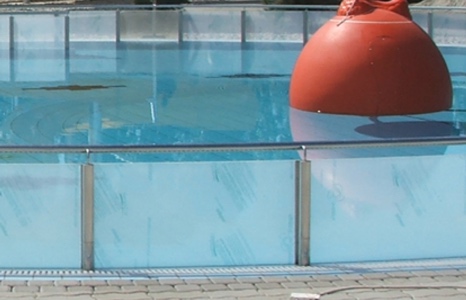
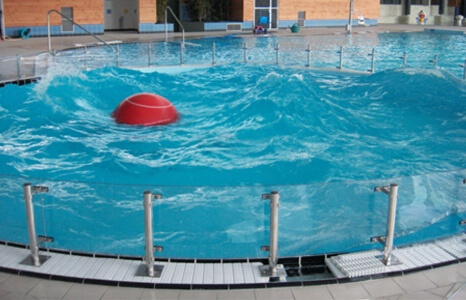
Depths
The depth profile of the pool is free.
On the other hand, a minimum water depth is required just below the WaveBall for each WaveBall model.
The minimum depth must be respected within a radius of 3 meters around the position of the anchorage.
Depending on the model, the minimum depths are different.
To learn more, please visit our waveball models page.
Filtration
The filtration inlet should affect the freeboard as little as possible.
Several solutions exist.
Surface finishing
The finishing surface of the pool can be of several types such as concrete, liner, stainless steel, etc …
The cable entry and anchorage are designed differently depending on the finish surface of the pool.
Electrical configurations
The electrical configuration is related to the choice of positions for the :
- Control Box (RCU) – that allows the Waveball to turn on and off.
- Transformers – that provides 12V power to the Waveball
4 standard configurations are possible:
All in one




WaveBall 12 V power cable (umbilical cable)
The WaveBall is powered by a 12V cable.
Several configurations exist for the passage of the 12V cable in the pool.
Here are some examples:
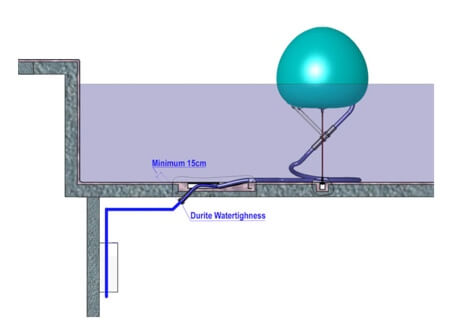
Ground cable via pipe
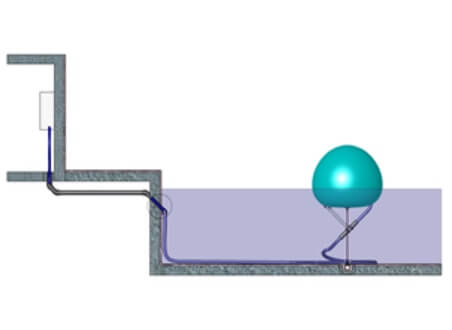
Apparent cable

Cable equipped with buoys
